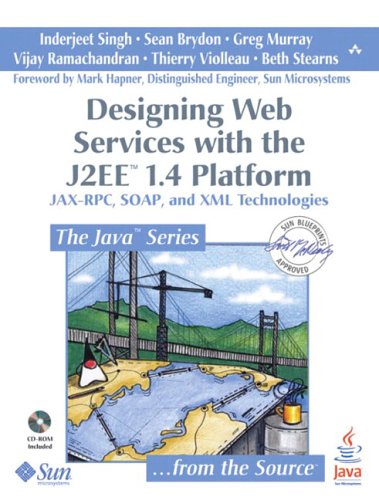
Designing Web Services with the J2EE 1.4 Platform
by Inderjeet Singh, at al.
Publisher: Prentice Hall PTR 2004
ISBN/ASIN: 0321205219
ISBN-13: 9780321205216
Number of pages: 464
Description:
This is the authoritative guide to the best practices for designing and integrating enterprise-level Web services using the Java 2 Platform, Enterprise Edition (J2EE) 1.4. This book provides the guidelines, patterns, and real-world examples architects and developers need in order to shorten the learning curve and start building robust, scalable, and portable solutions.
Download or read it online for free here:
Read online
(online reading)
Similar books
 Mastering Enterprise JavaBeans 3.0
Mastering Enterprise JavaBeans 3.0by R. P. Sriganesh, G. Brose, M. Silverman - Wiley
Covering basic through advanced subjects, Mastering Enterprise JavaBeans 3.0 is more than 50 percent new and revised. You'll learn the concepts and techniques for authoring distributed, enterprise components in Java from the ground up.
(20266 views)
 Core Servlets and Javaserver Pages
Core Servlets and Javaserver Pagesby Marty Hall, Larry Brown - Prentice Hall PTR
This book explains the role of servlets and JavaServer Pages (JSP) in creating e-commerce sites, dynamic web sites, and web-enabled services. Aimed to developers familiar with the Java but have little or no experience with server-side applications.
(23467 views)
 Jakarta Struts Live
Jakarta Struts Liveby Richard Hightower - SourceBeat
Getting started with Struts, testing Struts applications, actionforms and dynaactionforms, the validator framework, the model-view-controller architecture, the Struts tag library, using tiles, the JSTL and Struts, internationalization (I18N), etc.
(17461 views)
 Your First Cup: An Introduction to the Java EE Platform
Your First Cup: An Introduction to the Java EE Platform- Oracle
This is Your First Cup: An Introduction to Java EE Platform, a short tutorial for beginning Java EE programmers. This tutorial is designed to give you a hands-on lesson on developing an enterprise application from initial coding to deployment.
(16840 views)